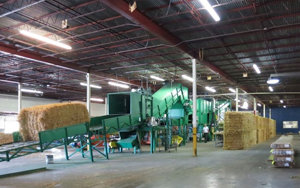Texas Company Begins Producing Straw-Based Building Materials
 FORT WORTH, Texas — A new construction materials manufacturer in Texas recently began production on a product that integrates traditional light gauge framing and a straw-based compressed agricultural fiber (CAF) to create a sustainable building component.
FORT WORTH, Texas — A new construction materials manufacturer in Texas recently began production on a product that integrates traditional light gauge framing and a straw-based compressed agricultural fiber (CAF) to create a sustainable building component.
The company, Stramit USA, collaborated with Stramit Technology Holdings in the United Kingdom to bring the technology to the United States. Stramit USA invested about $2.5 million in improvements to its 88,000-square-foot manufacturing facility in Fort Worth, where approximately 25 employees work. The company plans to employ about 100 workers by early 2014.
At its Fort Worth factory, the company uses a machine nearly 300-feet long to break apart bales of wheat straw, remove any debris and short strands, and compress the remainder under extreme heat and pressure to create rigid boards. The boards are then wrapped in heavy-duty organic paper and cut to length.
The company purchases the wheat straw leftover from harvest, providing a secondary cash crop for agriculturalists.
“Wheat straw, unlike corn, will never be food again and it will never be fuel,” said Tim Evans, Stramit USA’s executive vice president of sales and marketing and a partner in the company. “It’s a great use of a raw material.”
The company’s signature product, the Stramit CAFboard, may be used as walling, flooring, paneling, and doors in residential and commercial projects. Stramit USA also claims that the CAFboard provides a sustainable alternative to fiberglass insulation, particle and gypsum boards, and soundproofing panels.
“Stramit’s process produces a carbon-neutral product that is strong and durable,” said Phil Morley, Stramit USA’s Director of Design and LEED AP, in a press release. “These materials are good for the environment from start to finish and can help those seeking LEED credits.”
The company also states that the Stramit CAFboards are nontoxic; highly sound absorbent; and mold-, pest-, and fire-resistant. The manufacturer combines its CAFboards with light-gauge steel framing made from mostly recycled sources to create a panelized system used for building shells.
“If a traditional construction project takes up to 10 weeks, you could expect the Stramit panelized system to take about one week,” said Evans.
The Stramit CAFboard possesses an approximate R-value of 3.35 per inch, while two layers of standard 2.25-inch CAFboard achieves an in-place R-value exceeding 15. The product can also assist in achieving 13 LEED credits, according to the company.
The process of compressing wheat straw into boards was first developed in Sweden nearly 70 years ago. Today, houses made from straw-based materials manufactured by Stramit Technology Holdings exist throughout Europe.
In the United States, the technology is still relatively new. The Fort Worth post office on 8th Avenue Station was constructed of CAFboard in 1997; the government facility was also Texas’ first building to receive LEED Gold.
